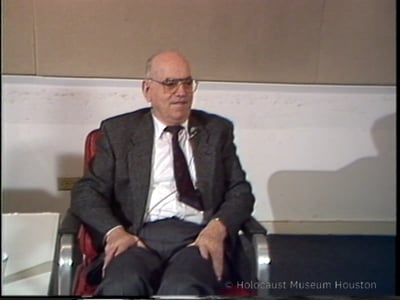“I don’t remember much about my family,” commented Wolf Finkelman, the only survivor of the nine, “except the little things, like my father being strict and my mother always protecting the children, just like a typical Jewish family. We were very close, the whole family was a close family.”
On September 1, 1939, the Finkelmans were listening to their radio when they learned that German troops had crossed the Polish border and were headed east. Within weeks Poland surrendered. Immediately, Jews were singled out for abuse. In 1941, the Finkelman family was forced to resettle in the ghetto of Rzeszów, where both food and warm clothing were scarce. Soon after most of them were deported to concentration camps. Wolf and his brothers, Heniek and Stephen, managed to evade capture until 1943, when they were sent to Szebnie, a labor camp in Galicia. There, Wolf and the other inmates were routinely forced to watch their German captors terrorize, torture and murder their Jewish victims.
After six months, Wolf and Stephen were among the prisoners loaded on cattle cars bound for Auschwitz. “They put my brother to go to the right and me to go to the left,” Wolf said of their arrival in the camp. “I tried to get to him, he tried to get to me and we never could get to each other.” Wolf was tattooed and given a striped uniform and wooden clogs. Thirteen years old and unskilled, he told his captors he was a 17-year-old mechanic, so he was sent to a labor camp where he was forced to build anti-aircraft guns for the Germans. As Russian troops approached at the end of 1944, the inmates were sent to the camps of Mauthausen and then Gunskirchen, both in Austria. Wolf recalls chaos, overcrowding and dead bodies everywhere.
One day in early May 1945, the German guards simply vanished from Gunskirchen. Other inmates stormed the food storehouses, but Wolf crept into the guards’ barracks and, for the first time in years, slept in a bed with sheets and blankets. Shortly after American troops arrived. In December 1946, Wolf sailed with a group of 18 other war orphans to New York. He continued on to Houston where Jewish Family Services helped support him while he finished high school. A job at Leff Brothers Dry Goods Company led Wolf to a career in the clothing industry. Today, he owns one of the largest wholesale clothing import businesses in the United States. Wolf married Ruth Levy and the couple raised three sons. Ruth died in 1998 and Wolf married Rose Gordon two years later. He is active with many Jewish organizations, and has worked on special projects for the United States Holocaust Memorial Museum.
Parents
Joseph Finkelman, d. Bełżec
Masha Finkelman, d. Bełżec
Siblings
Heniek (Hersch), d. Szebnie
Hanah, d. Bełżec
Malka, d. Bełżec
Stephen, d. Auschwitz
Hill, d. Bełżec
Marsha, d. Bełżec

